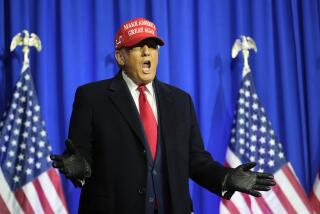Handcuffing Trade
By the time the Senate completes the elaboration of its trade bill, there will be something in it for everyone. And very little in it that truly meets the national need at this critical economic juncture. That is why President Reagan’s threat of a veto is not an idle gesture but, more likely, the only device to rescue the nation from the excesses inevitable in this kind of a scramble by Washington’s interest groups.
The fact is that existing trade legislation is adequate, and all that needs to be done is to renew the fast-track international trade negotiating authority for the President before it expires in January.
There will be a debate, when the Senate concludes its work, about whether it has produced a bill better or worse than what the House of Representatives did earlier this year. If political analysts are correct, however, the Senate bill will be about as defective and dangerous as the House bill, although it may forgo the most outrageous provision of the House bill--the amendment by Rep. Richard A. Gephardt (D-Mo.) to mandate arbitrary reprisals against nations with large surpluses in their trade with the United States.
That same fascination with mandatory responses pervades the proposals before the Senate, including a particularly insidious provision that would deny presidential discretion in responding to recommendations for tariffs to protect American industries hurt by foreign competition--not unfair competition, but any competition. That would protect uncompetitive American businesses and bring on an international firestorm of retaliation.
Much is being said on Capitol Hill about fairness, and that is indeed important. But most of the fairness proposals are flimsy disguises for protectionism. There are foreign markets that have treated American exports unfairly, but every serious study of the subject has shown that those unfair trading practices account for only a small portion of the export weakness. Furthermore, there are already adequate instruments for addressing unfairness, and there will be even more if the next General Agreement on Tariffs and Trade succeeds as promised in the Uruguay meeting earlier this year.
The legislation includes more than $1 billion in new farm subsidies just when critical global negotiations are to begin to dismantle the farm-support programs that have distorted markets and punished efficient farmers. It proposes quotas on some specific imports, like lamb, and offers supports for particular domestic products, including tobacco. There are penalties against specific foreign companies because of their role in transferring defense technology to Moscow--provisions that do not belong in a trade bill, however reprehensible the trade deals may have been. And there are proposals to deny presidential discretion based on national security and the overall economy--proposals that invite the very kind of narrow protectionism that exacerbated the Great Depression in the 1930s.
Prospects for a positive outcome are further clouded by a decision of at least some Democratic leaders in Congress to make a “tough” trade bill a partisan cause. Some House Democrats already are complaining about caucus pressures to conform to the bill adopted in the spring. We cannot imagine any party campaigning successfully in the next election on a platform of protectionism, however cleverly the trade restraints may be disguised.
The need is for a short and simple bill, strengthening the authority of the President to respond forcefully but flexibly to unfairness, and encouraging, not inhibiting, a strong American role in the new Uruguay Round of GATT.
More to Read
Inside the business of entertainment
The Wide Shot brings you news, analysis and insights on everything from streaming wars to production — and what it all means for the future.
You may occasionally receive promotional content from the Los Angeles Times.








